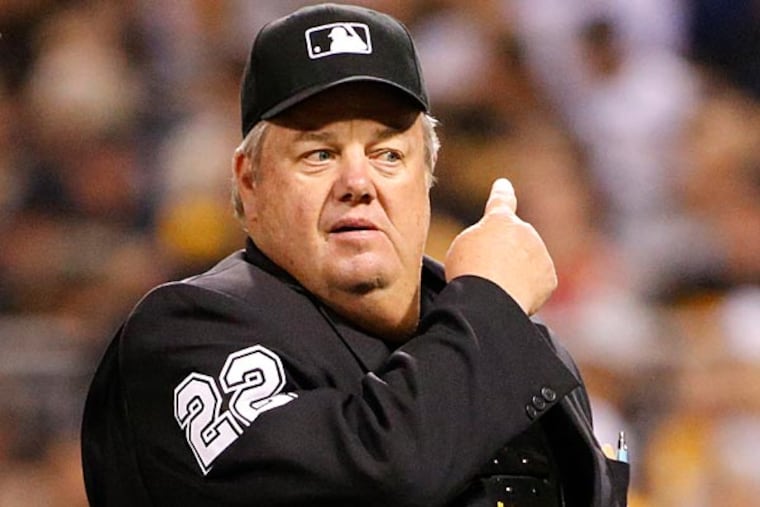Joe West unlikable, but at least he's entertaining
Last Sunday's confrontation between Jonathan Papelbon and Joe West was difficult to watch. I mean, whom do you pull for in a battle of baseball boors?

Last Sunday's confrontation between Jonathan Papelbon and Joe West was difficult to watch. I mean, whom do you pull for in a battle of baseball boors?
In this instance, though, I was, you should pardon the expression, a Papelbon supporter.
Who, after all, could possibly side with West, the Wild Bull of the Pompous? The umpire's perpetually smug expression is one constant provocation.
I wrote in 2007 that if ever a Hall of Fame for arrogance were created, West would be in its initial class, suggesting the umpire's plaque would probably read like this:
"Joseph Henry 'Cowboy Joe' West. Longtime MLB umpire. Born 1952 in Asheville, N.C. Died 2011 after Cubs manager Lou Piniella pummeled him with a bat. Worked home plate in first Supercilious Bowl. Supplemented umpiring income by recording country music, in process proving his eyesight wasn't his only impaired faculty. In 20-plus seasons, set records that likely will stand forever: infuriated 323 managers; displayed sneering disdain for 248 coaches; showed utter contempt for 1,674 players."
While most umpires shun the spotlight, West seeks it out. As "Cowboy Joe," he writes and sings country music. He's got a publicity agent. He's been in a movie and on a TV show. He golfs on the Celebrity Players Tour.
Historically, some of West's worst moments have involved the Phillies. For whatever reason, they seem less able than most clubs to resist his baiting.
Papelbon wasn't the first Phillie whom West has manhandled. In 1990, during a Mets-Phils brawl at Shea Stadium, he body-slammed pitcher Dennis Cook.
In 1994, Lenny Dykstra stepped out of the batter's box and asked West, who was occupying a spot near second base, to move. The Phils hitter thought the umpire, in his line of vision, was an unnecessary distraction.
Anyone else would have acquiesced. West, arms folded, refused to budge.
A year later, after Darren Daulton disgustedly dropped his bat following a called third strike, West followed the catcher toward the dugout. Not satisfied, he then picked up the discarded bat and ordered it brought to the umpires room.
"He wasn't using it anyway," West explained.
When a fan protested too loudly, West had him ejected.
Daulton was asked why he hadn't put up much of a fight.
"I had four hours back there with Joe West," he said. "I just wanted to get back to the dugout."
About that time, I wrote something negative about West. It was neither the first nor last time I did so, but this one provoked a response.
A day later, a press-box attendant told me West wanted to meet after the game, not in an alley but outside Veterans Stadium's umpires room.
There, having changed his outfit but still wearing his trademark sneer, he asked why I disliked him.
"Why should I be any different from the rest of mankind?" I said.
We parted amicably.
And yet, for all his faults, baseball fans might soon be pining for West. His infuriating demeanor and the outbursts it provokes are reminders of a dying baseball tradition - the rhubarb.
Those spittle-spewing, dust-raising disputes between managers and umps - as much a factor in baseball's allure as home runs - will soon be extinct, if they aren't already.
No more Earl Weavers or Dallas Greens raging. No more bats tossed from dugouts or uprooted bases. No more chest collisions or nose knocks.
What's killed it all, of course, is instant replay, the worst baseball idea since John Felske.
Managers no longer charge out to challenge questionable calls. Instead, they stroll slowly toward the umpire and, as unseen colleagues view a replay, wait for a dugout signal on the wisdom of an appeal.
How entertaining.
For a sport that most young Americans already find dull, baseball seems intent on removing some of its most appealing elements. Heated arguments, brushback pitches, and home-plate collisions are just a few notable examples.
I understand the value of technology. And accuracy should be the goal of everyone, especially umpires. But at what price?
Where is it written that baseball has to be perfect? Right or wrong, judgment calls are part of the game, part of its charm, part of its tradition.
If the umpire is wrong, you boo him, curse him, argue with him. You don't make him irrelevant.
"Baseball fits America well," former commissioner Bart Giamatti once noted, "because it expresses our longing for the rule of law while licensing our resentment of lawgivers."
Take away that resentment, that delicious antagonism, and the umpires might just as well be machines. And baseball might just as well be any other game.
I recall one of my children's Little League games years ago. The umpire had failed to show up, and a father was recruited from the stands.
He got some calls right and some wrong, but the parents, even those from his son's team, rode him mercilessly.
Afterward, I saw him and several of the loudest hecklers sharing a few beers in the parking lot.
"That," the substitute umpire said to his onetime antagonists, "was a lot of fun."
That, he might have added, was baseball.